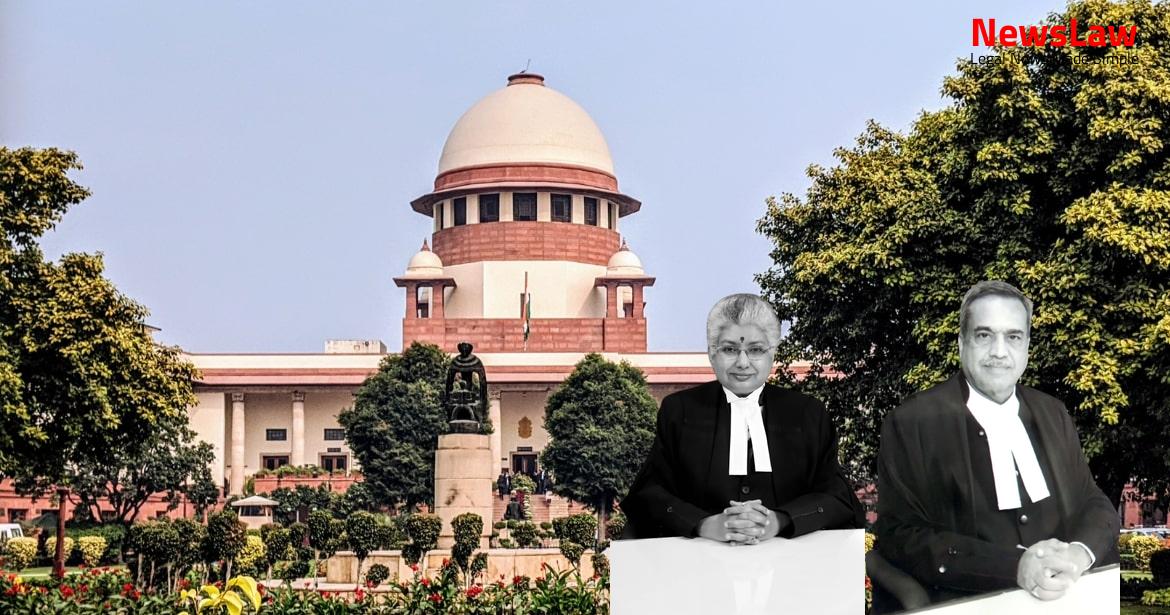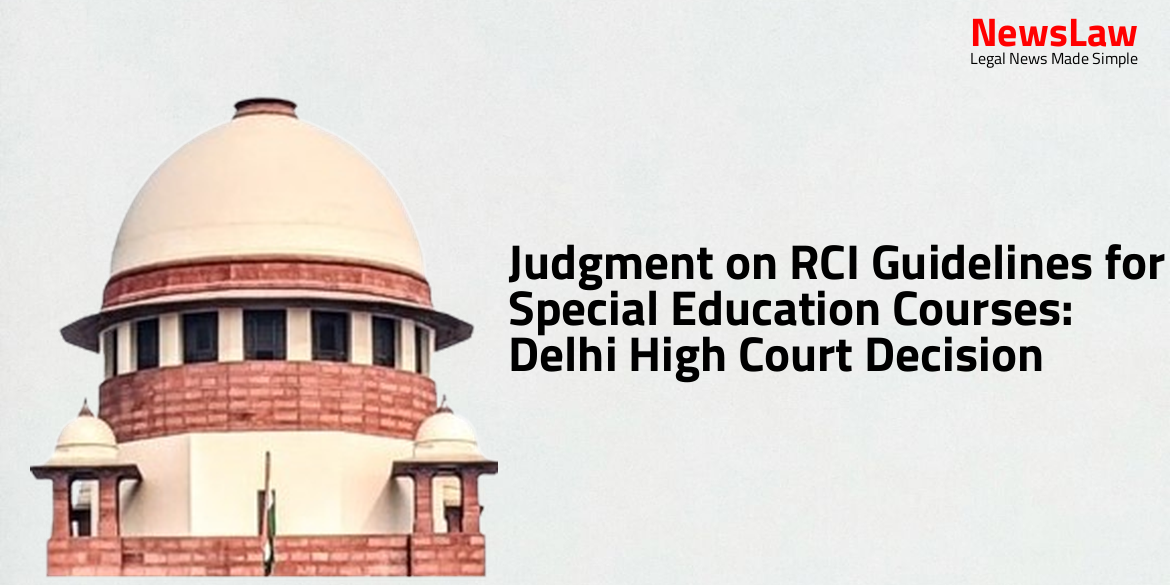Discover the legal nuances surrounding a case where the court delves into the analysis of contempt jurisdiction in a scenario of non-compliance with court orders. The court’s careful examination of the contemnors’ actions sheds light on the significance of obeying judicial directives to uphold the integrity of the legal system. Stay tuned to unravel the legal intricacies at play in this insightful case analysis.
Facts
- The respondents, alleged contemnors, were granted eight weeks’ time by the court to comply with the order passed by the High Court dated 08.08.2019.
- The respondents filed a special leave petition challenging the order dated 08.08.2019 in Notice of Motion No 960 of 2019 and in Commercial Arbitration Petition No 55 of 2019.
- The special leave petition was dismissed by the Court on 17.09.2021.
- The respondents had also filed Miscellaneous Application No 1668 of 2021 seeking non-compliance with the order dated 28.10.2021.
- An application was filed by the respondents to recall the order dated 28.10.2021, but it was dismissed on 25.01.2022.
- The respondents were directed to comply with and deposit the amount as per the order passed by the High Court dated 08.08.2019 within the time granted by the Court.
- Prior to filing the Miscellaneous Application No 61 of 2022, the petitioners had already filed a contempt petition alleging disobedience of the order dated 28.10.2021.
- The respondents had prayed for further eight weeks’ time from 17.09.2021 to comply with the order dated 08.08.2019 by depositing 50% of the awarded amount by the Arbitrator.
- The Award Creditor had filed an execution petition before the High Court being Commercial Execution Application No 2908 of 2018 even before the challenge under Section 34 of the Act of 1996 was made.
- Miscellaneous Application No 1668 of 2021 was filed to recall the order granting eight weeks’ time to the respondents, petitioners before the Court.
- The High Court passed an order on 08.08.2019 which was not complied with by the respondents.
- Orders passed by the High Court on 17.09.2021 and by the Court on 28.10.2021 were also not obeyed.
- A legal notice was sent to the respondents to comply with the orders, warning of further legal action if not complied with.
- The respondents were required to deposit 50% of the awarded sum within twelve weeks, with serious consequences for non-compliance.
- Extensions were sought by the respondents but despite that, the orders were not complied with.
- The respondents were directed to file a disclosure affidavit declaring their assets, which they failed to comply with.
- During the pendency of a Commercial Appeal, the respondents requested extensions to deposit the amount as directed by the Court.
- Another legal notice informed the respondents that the granted time to comply with the orders had expired.
Also Read: Ruling on Circumstantial Evidence in Murder Case
Arguments
- Respondents failed to deposit the amount as ordered by the learned Single Judge despite multiple court orders.
- They claimed inability to comply due to financial constraints, which the petitioner argues is an afterthought and a wilful act of disobedience.
- The petitioner contends that the respondents have the financial capacity to pay, citing the potential sale of development rights worth Rs. 100 crores.
- The non-compliance is not just of the order dated 08.08.2019 and 17.09.2021, but also of the subsequent order dated 28.10.2021, which issued a specific mandatory direction with serious consequences for non-compliance.
- The petitioner’s counsel, Shri Bhushan, argued that the respondents consistently delayed the execution of the award at every stage by filing various motions and obtaining interim stays.
- Despite efforts by the respondents, they were unable to comply with the deposit condition due to challenges and difficulties.
- The total sum of Rs. 190 crores is due and payable by the respondents from an award passed four years ago.
- The petitioner cited relevant court decisions to support the claim of wilful disobedience by respondent No 1.
- The respondents, represented by Shri Divan, argued that the contempt of court proceedings were not the appropriate remedy for enforcing the award, citing the R.N. Dey case.
- There was a debate on whether the orders regarding deposit were mandatory, with the respondents asserting that they were not.
- The respondents have put forward their efforts at compliance, including submitting a demand draft and being prepared to submit further amounts.
- The respondents’ failure to disclose assets as directed by the High Court was also highlighted by the petitioner as a sign of non-compliance.
- Negotiations for settlement in the commercial dispute are ongoing.
Also Read: Challenging Legal Presumptions in Negotiable Instrument Cases
Analysis
- The respondents failed to comply with the order dated 28.10.2021 in Miscellaneous Application No. 1668 of 2021 despite specific directions.
- The respondents attempted to avoid compliance with the High Court’s order by various means, showing an obstructive attitude.
- The respondents’ claim of financial difficulties as a reason for non-compliance was considered unacceptable due to their conduct and delay tactics.
- The Court’s order dated 28.10.2021 was found to be a mandatory direction that the respondents were obligated to follow.
- The respondents’ delay in complying with court orders and attempting to recall previous orders showed a lack of bonafide intentions.
- The respondents’ actions were seen as a deliberate attempt to delay and obstruct the execution of the award.
- Despite multiple extensions granted to the respondents, they continued to evade compliance with the court’s directives, leading to contempt proceedings.
- The Court emphasized the importance of respecting and abiding by court orders to maintain the integrity of the legal system.
- Delay in compliance may lead to contempt of court, as seen in State of Bihar vs Subhash Singh
- Contempt jurisdiction is unaffected by the rights of the parties, as shown in Bank of Baroda vs Sadruddin Hasan Daya
- The excuse of financial constraint for not complying with court orders is considered an afterthought and lacks bonafides
- Plea of financial constraint was not raised earlier, indicating lack of genuineness in current stand
- Maruti Udyog vs. Mahinder C. Mehta case implies that contempt jurisdiction can be invoked even if a decree is not immediately executable
- Rama Narang vs Ramesh Narang establishes that contempt jurisdiction can be invoked in cases where a contemnor’s conduct interferes with the due course of justice
- Requirement of deposit was mandatory not directory for contempt
- Conduct of contemnor determines if a case for contempt exists
- Respondent-contemnors conduct justifies invocation of contempt jurisdiction
- Contemnors unreasonably delayed and defaulted in compliance without explanation
- Contemnors sought to avoid compliance even after benefitting from extended time
Also Read: Legal Analysis Critique in High Court’s Quashing Order
Decision
- Respondents found guilty of willful disobedience of court orders
- Specifically held liable for disobeying orders dated 08.08.2019 and 28.10.2021
- Petition filed to punish respondents under Contempt of Courts Act
- Prayer made to penalize respondents for disobeying orders dated 17.09.2021 and 28.10.2021
Case Title: URBAN INFRASTRUCTURE REAL ESTATE FUND Vs. DHARMESH S. JAIN (2022 INSC 296)
Case Number: CONMT.PET.(C) No.-000940 / 2021



